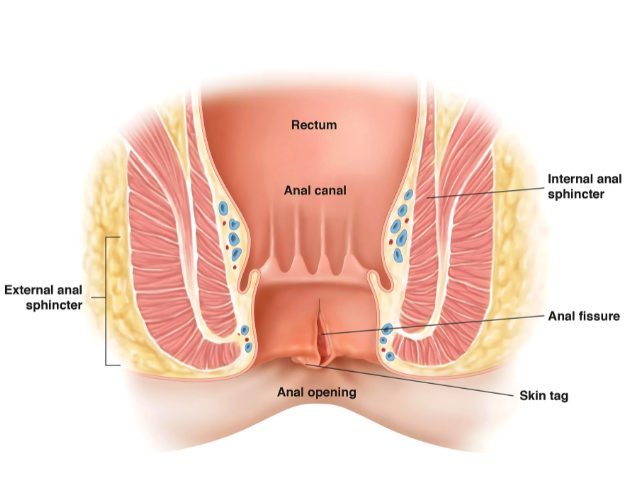Experience advanced, pain-free laser treatment for anal fissures at KK Virat Hospital, Karimnagar. Our expert proctologists ensure quick recovery with minimally invasive procedures, reducing pain, bleeding, and recurrence. Book your consultation today for the best care and hassle-free treatment!
What is Anal Fissure?
An anal fissure is a small tear in the skin surrounding the anus. It can cause severe pain, discomfort, and bleeding during bowel movements. The primary cause of anal fissures is trauma to the inner lining of the anus, often due to constipation or chronic diarrhoea. If left untreated, an acute fissure can become chronic and more difficult to heal, leading to potential complications such as infections or even serious conditions like anal fistula.

Types of Anal Fissure
- Acute Anal Fissure
- Chronic Anal Fissure
Risk Factors of Anal Fissure
- Advanced age
- Chronic constipation
- Recent childbirth
- Crohn’s disease
- Inflammatory bowel disease
- Anal intercourse
Home Remedies for Anal Fissure
- Take sitz baths for pain relief
- Increase fibre intake to soften stools
- Use stool softeners if necessary
- Avoid straining during bowel movements
- Stay hydrated by drinking plenty of fluids
Diagnosis of Anal Fissure
The doctor performs a gentle examination of the anal region to detect tears or cuts. Depending on the condition, additional tests such as colonoscopy, flexible sigmoidoscopy, or anoscopy may be recommended.
Complications of Untreated Anal Fissure
Delaying treatment can lead to:
- Tearing of surrounding muscles, potentially leading to an anal fistula.
- Chronic fissure with increased pain and bleeding
- Recurrent anal fissures
How to Relieve Anal Fissure Itching?
- Avoid scratching to prevent irritation
- Wear breathable cotton underwear
- Clean the area with lukewarm water and mild soap
- Avoid scented soaps and irritants
- Use zinc oxide ointments or petroleum jelly
Difference Between Anal Fissure and Anal Fistula
| Feature | Anal Fissure | Anal Fistula |
|---|---|---|
| Definition | A small tear in the anal lining | An abnormal passage between the anal canal and skin |
| Causes | Hard stool, diarrhoea, trauma | Abscess, infection |
| Symptoms | Pain, bleeding, itching | Pus discharge, swelling, pain |
| Treatment | Laser surgery, medications | Laser surgery, fistulotomy |
Why Choose KK Virat Hospital for Ingrown Toenail Removal?
At KK Virat Hospital, we offer minimally invasive laser surgery for anal fissures. This procedure involves using a laser probe to enhance blood flow in the affected region, promoting faster healing. In some cases, a small portion of the anal sphincter is removed to relieve pressure and reduce pain.
Benefits of Laser Surgery for Anal Fissure:
- Minimally invasive procedure
- Quick recovery (within 2-5 days)
- Reduced pain and bleeding
- Lower risk of recurrence
- Short hospital stay (usually same-day discharge)
Your Health, Our Priority – Book Your Consultation Today!
Don’t let anal fissures affect your quality of life. Get advanced laser treatment at KK Virat Hospital, Karimnagar for quick relief and permanent results. Contact us today to schedule a consultation with our expert proctologists!
- Call Us Directly: Get in touch with our medical coordinators to schedule an appointment with an expert urologist.
- Direct Visit: You can visit our hospital directly by carrying your previous medical records if you have a medical history. However, admission will be based on the doctor’s recommendation.
Can anal fissures occur along with piles and fistula?
Yes, anal fissures can occur alongside piles (haemorrhoids) and anal fistulas. These conditions may develop due to chronic constipation, straining during bowel movements, or infections in the anal region.
How long will it take to complete the laser fissure surgery?
Laser fissure surgery is a quick, minimally invasive procedure that typically takes 30 to 45 minutes. Most patients can return home the same day and resume daily activities within a few days.
What are the risks of fissurectomy (open fissure surgery)?
Open fissure surgery (fissurectomy) may involve risks such as pain, infection, delayed healing, anal stenosis (narrowing of the anal canal), or temporary faecal incontinence. Laser surgery offers fewer complications and faster recovery.
Will my insurance cover laser fissure surgery at KK Virat Hospital?
No, anal fissures are small tears in the anal lining, while haemorrhoids are swollen blood vessels in the anal or rectal area. Both conditions can cause pain and bleeding but require different treatments.
How long does it take to recover after laser fissure surgery?
Recovery after laser fissure surgery is quick, with most patients experiencing relief within 2-5 days. Complete healing usually takes 2-4 weeks, depending on post-surgical care and lifestyle changes.
Can anal fissures be cured at home?
Acute anal fissures can often heal at home with sitz baths, fibre-rich diets, hydration, and stool softeners. However, chronic fissures may require medical intervention, including medication or surgery.
What is the permanent cure for anal fissure?
The permanent cure for chronic anal fissures is laser surgery, which ensures fast healing, minimal pain, and low recurrence risk. In some cases, lifestyle changes and medications can help manage mild fissures.
What foods should I avoid after fissure surgery?
After fissure surgery, avoid spicy foods, caffeine, alcohol, processed foods, and red meat as they may cause constipation or irritation. Stick to a high-fiber diet with plenty of fruits, vegetables, and whole grains.


